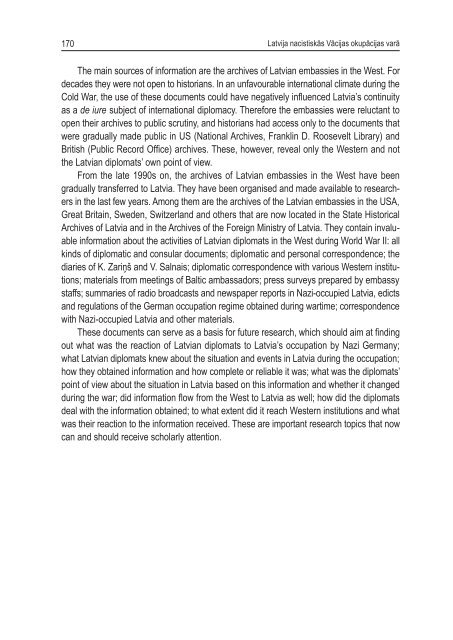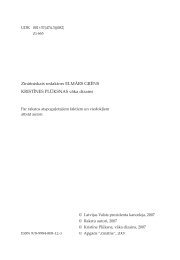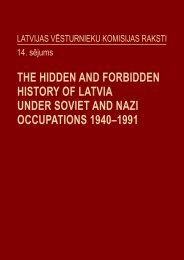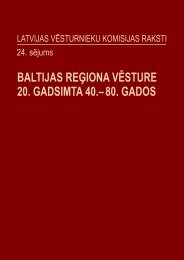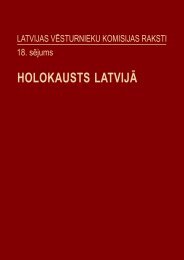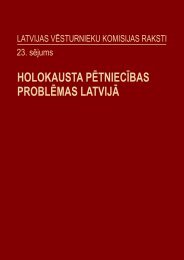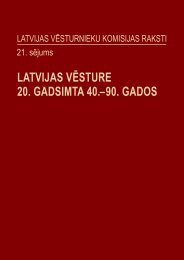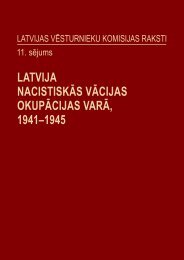- Page 1:
LATVIJAS VĒSTURNIEKU KOMISIJAS RAK
- Page 4 and 5:
Latvijas Vēsturnieku komisija Latv
- Page 6 and 7:
SATURS Priekšvārds . . . . . . .
- Page 8 and 9:
Saturs Juris Pavlovičs No Man’s
- Page 10 and 11:
PRIEKŠVĀRDS Jau piecpadsmito reiz
- Page 12 and 13:
Priekšvārds Karaspēka drosmes, l
- Page 14 and 15:
PADOMJU OKUPĀCIJA 1940-1941 SOVIET
- Page 16 and 17:
Alfreds Erihs Senns Baltijas kaujas
- Page 18 and 19:
Alfreds Erihs Senns. Baltijas kauja
- Page 20 and 21:
Alfreds Erihs Senns. Baltijas kauja
- Page 22 and 23:
Alfreds Erihs Senns. Baltijas kauja
- Page 24 and 25:
Alfreds Erihs Senns. Baltijas kauja
- Page 26 and 27:
Alfreds Erihs Senns. Baltijas kauja
- Page 28 and 29:
Alfreds Erihs Senns. Baltijas kauja
- Page 30 and 31:
Alfreds Erihs Senns. Baltijas kauja
- Page 32 and 33:
Arvydas Anušauskas Massacre of Mil
- Page 34 and 35:
Arvydas Anušauskas. Massacre of Mi
- Page 36 and 37:
Arvydas Anušauskas. Massacre of Mi
- Page 38 and 39:
Arvydas Anušauskas. Massacre of Mi
- Page 40 and 41:
Arvydas Anušauskas. Massacre of Mi
- Page 42 and 43:
Arvydas Anušauskas. Massacre of Mi
- Page 44 and 45:
Arvydas Anušauskas. Massacre of Mi
- Page 46 and 47:
Kseniya Petrochenko. Problems of Se
- Page 48 and 49:
Kseniya Petrochenko. Problems of Se
- Page 50 and 51:
Kseniya Petrochenko. Problems of Se
- Page 52 and 53:
LATVIJA NACISTISKĀS VĀCIJAS OKUP
- Page 54 and 55:
Inesis Feldmanis Nacistu okupācija
- Page 56 and 57:
Inesis Feldmanis. Nacistu okupācij
- Page 58 and 59:
Inesis Feldmanis. Nacistu okupācij
- Page 60 and 61:
Inesis Feldmanis. Nacistu okupācij
- Page 62 and 63:
Inesis Feldmanis. Nacistu okupācij
- Page 64 and 65:
Inesis Feldmanis. Nacistu okupācij
- Page 66 and 67:
Inesis Feldmanis. Nacistu okupācij
- Page 68 and 69:
Inesis Feldmanis. Nacistu okupācij
- Page 70 and 71:
Inesis Feldmanis. Nacistu okupācij
- Page 72 and 73:
Antonijs Zunda Baltijas valstu prob
- Page 74 and 75:
Antonijs Zunda. Baltijas valstu pro
- Page 76 and 77:
Antonijs Zunda. Baltijas valstu pro
- Page 78 and 79:
Antonijs Zunda. Baltijas valstu pro
- Page 80 and 81:
Antonijs Zunda. Baltijas valstu pro
- Page 82 and 83:
Antonijs Zunda. Baltijas valstu pro
- Page 84 and 85:
Antonijs Zunda. Baltijas valstu pro
- Page 86 and 87:
Antonijs Zunda. Baltijas valstu pro
- Page 88 and 89:
Antonijs Zunda. Baltijas valstu pro
- Page 90 and 91:
Antonijs Zunda. Baltijas valstu pro
- Page 92 and 93:
Antonijs Zunda. Baltijas valstu pro
- Page 94 and 95:
Boris Sokolov. The Baltic States in
- Page 96 and 97:
Boris Sokolov. The Baltic States in
- Page 98 and 99:
Boris Sokolov. The Baltic States in
- Page 100 and 101:
Markku Jokisipilä Between the Uppe
- Page 102 and 103:
Markku Jokisipilä. Between the Upp
- Page 104 and 105:
Markku Jokisipilä. Between the Upp
- Page 106 and 107:
Markku Jokisipilä. Between the Upp
- Page 108 and 109:
Markku Jokisipilä. Between the Upp
- Page 110 and 111:
Markku Jokisipilä. Between the Upp
- Page 112 and 113:
Markku Jokisipilä. Between the Upp
- Page 114 and 115:
Markku Jokisipilä. Between the Upp
- Page 116 and 117:
Markku Jokisipilä. Between the Upp
- Page 118 and 119:
Markku Jokisipilä. Between the Upp
- Page 120 and 121: Markku Jokisipilä. Between the Upp
- Page 122 and 123: Markku Jokisipilä. Between the Upp
- Page 124 and 125: Markku Jokisipilä. Between the Upp
- Page 126 and 127: Markku Jokisipilä. Between the Upp
- Page 128 and 129: Kārlis Kangeris. 1995.-2004. gadā
- Page 130 and 131: Kārlis Kangeris. 1995.-2004. gadā
- Page 132 and 133: Kārlis Kangeris. 1995.-2004. gadā
- Page 134 and 135: Kārlis Kangeris. 1995.-2004. gadā
- Page 136 and 137: Kārlis Kangeris. 1995.-2004. gadā
- Page 138 and 139: Kārlis Kangeris. 1995.-2004. gadā
- Page 140 and 141: Kārlis Kangeris. 1995.-2004. gadā
- Page 142 and 143: Kārlis Kangeris. 1995.-2004. gadā
- Page 144 and 145: Kārlis Kangeris. 1995.-2004. gadā
- Page 146 and 147: Juris Pavlovičs. Okupācijas varu
- Page 148 and 149: Juris Pavlovičs. Okupācijas varu
- Page 150 and 151: Juris Pavlovičs. Okupācijas varu
- Page 152 and 153: Juris Pavlovičs. Okupācijas varu
- Page 154 and 155: Juris Pavlovičs. Okupācijas varu
- Page 156 and 157: Uldis Neiburgs. Latvijas Republikas
- Page 158 and 159: Uldis Neiburgs. Latvijas Republikas
- Page 160 and 161: Uldis Neiburgs. Latvijas Republikas
- Page 162 and 163: Uldis Neiburgs. Latvijas Republikas
- Page 164 and 165: Uldis Neiburgs. Latvijas Republikas
- Page 166 and 167: Uldis Neiburgs. Latvijas Republikas
- Page 168 and 169: Uldis Neiburgs. Latvijas Republikas
- Page 172 and 173: PADOMJU OKUPĀCIJA 1944-1959 SOVIET
- Page 174 and 175: Heinrihs Strods Latvijas sovetizāc
- Page 176 and 177: Heinrihs Strods. Latvijas sovetizā
- Page 178 and 179: Heinrihs Strods. Latvijas sovetizā
- Page 180 and 181: Heinrihs Strods. Latvijas sovetizā
- Page 182 and 183: Heinrihs Strods. Latvijas sovetizā
- Page 184 and 185: Heinrihs Strods. Latvijas sovetizā
- Page 186 and 187: Heinrihs Strods. Latvijas sovetizā
- Page 188 and 189: Heinrihs Strods. Latvijas sovetizā
- Page 190 and 191: Heinrihs Strods. Latvijas sovetizā
- Page 192 and 193: Heinrihs Strods. Latvijas sovetizā
- Page 194 and 195: Daina Bleiere Pēckara posms (1944-
- Page 196 and 197: Daina Bleiere. Pēckara posms (1944
- Page 198 and 199: Daina Bleiere. Pēckara posms (1944
- Page 200 and 201: Daina Bleiere. Pēckara posms (1944
- Page 202 and 203: Daina Bleiere. Pēckara posms (1944
- Page 204 and 205: Daina Bleiere. Pēckara posms (1944
- Page 206 and 207: Daina Bleiere. Pēckara posms (1944
- Page 208 and 209: Daina Bleiere. Pēckara posms (1944
- Page 210 and 211: Daina Bleiere. Pēckara posms (1944
- Page 212 and 213: Ritvars Jansons Latvijas PSR droš
- Page 214 and 215: Ritvars Jansons. Latvijas PSR droš
- Page 216 and 217: Ritvars Jansons. Latvijas PSR droš
- Page 218 and 219: Ritvars Jansons. Latvijas PSR droš
- Page 220 and 221:
Ritvars Jansons. Latvijas PSR droš
- Page 222 and 223:
Ritvars Jansons. Latvijas PSR droš
- Page 224 and 225:
LATVIJAS VĒSTURNIEKU KOMISIJAS PAZ
- Page 226 and 227:
Latvijas okupācija: vēsturiskie u
- Page 228 and 229:
Inesis Feldmanis. Latvijas okupāci
- Page 230 and 231:
Inesis Feldmanis. Latvijas okupāci
- Page 232 and 233:
Inesis Feldmanis. Latvijas okupāci
- Page 234 and 235:
Inesis Feldmanis. Latvijas okupāci
- Page 236 and 237:
Inesis Feldmanis. Latvijas okupāci
- Page 238 and 239:
Inesis Feldmanis, Kārlis Kangeris.
- Page 240 and 241:
Inesis Feldmanis, Kārlis Kangeris.
- Page 242 and 243:
Inesis Feldmanis, Kārlis Kangeris.
- Page 244 and 245:
Inesis Feldmanis, Kārlis Kangeris.
- Page 246 and 247:
LATVIJAS VĒSTURNIEKU KOMISIJAS RAK
- Page 248 and 249:
Rakstu krājumi 1. Latvija Otrajā
- Page 250 and 251:
Rakstu krājumi 11. Latvija nacisti
- Page 252 and 253:
Rakstu krājumos ievietotie raksti
- Page 254 and 255:
Rakstu krājumos ievietotie raksti
- Page 256 and 257:
Rakstu krājumos ievietotie raksti
- Page 258 and 259:
Rakstu krājumos ievietotie raksti
- Page 260 and 261:
Rakstu krājumos ievietotie raksti
- Page 262 and 263:
Rakstu krājumos ievietotie raksti
- Page 264 and 265:
Rakstu krājumos ievietotie raksti
- Page 266 and 267:
Rakstu krājumos ievietotie raksti
- Page 268 and 269:
Rakstu krājumos ievietotie raksti
- Page 270 and 271:
Rakstu krājumos ievietotie raksti
- Page 272 and 273:
Rakstu krājumos ievietotie raksti
- Page 274 and 275:
Rakstu krājumos ievietotie raksti
- Page 276 and 277:
Rakstu krājumos ievietotie raksti
- Page 278 and 279:
Rakstu krājumos ievietotie raksti
- Page 280 and 281:
Rakstu krājumos ievietotie raksti
- Page 282 and 283:
Autoru rādītājs Karlsons Gatis 2
- Page 284 and 285:
KRĀJUMĀ IEVIETOTO RAKSTU AUTORU S


